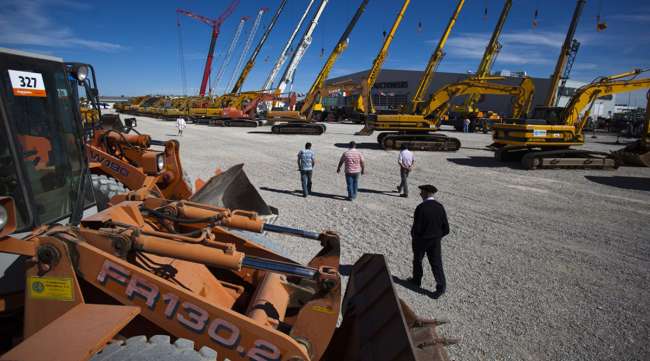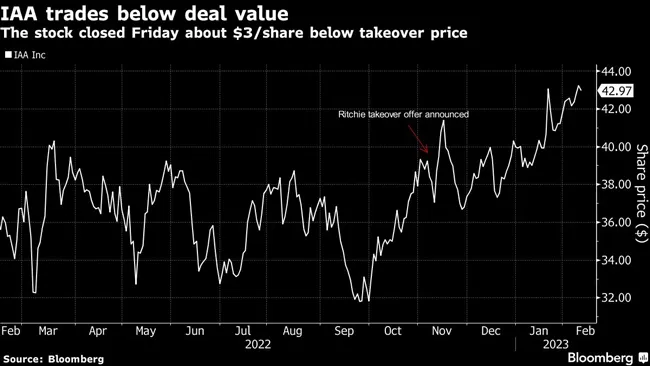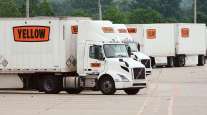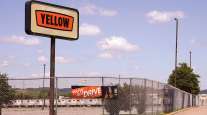Bloomberg News
Ritchie CEO Promotes Merits of IAA Deal Ahead of Vote Showdown

[Stay on top of transportation news: Get TTNews in your inbox.]
Ritchie Bros. Auctioneers Inc. has the potential to double its share price if it takes over IAA Inc., its CEO said as she launches a final push to fend off opposition from some shareholders to the deal.
The cost savings and revenue gains from the merger may be worth as much as $76 per Ritchie share, CEO Ann Fandozzi said in a letter to shareholders. “We know how to acquire and integrate to create value,” she wrote.
“It is a magical deal. You just don’t see these every day,” Fandozzi said in an interview. “This is my third CEO role. I have never seen this magnitude” of shareholder value in a merger, she said.
Ritchie rose 0.8% to $63.54 at 9:57 a.m. in New York on Feb. 13. The company also released preliminary fourth-quarter results showing revenue of $444 million.
Some holders, including Janus Henderson Group Plc, have been less enthusiastic and are openly opposing the deal, while others led by Starboard Value LP have come out in support of it. The showdown over the fate of the deal is set for March 14, when Ritchie shareholders vote.
Ritchie, a seller of industrial equipment based near Vancouver, has offered about $6 billion in cash and shares for IAA, which auctions damaged and written-off vehicles. The market’s initial reaction was negative — Ritchie’s share price tumbled 18% on the day of the announcement in November. It has since recovered those losses.

Fandozzi’s estimate of $76 a share is based on as much as $120 million in cost savings by the end of 2025 and as much as $780 million in additional earnings before interest, taxes, depreciation and amortization from the potential revenue of the combined companies.
Part of the strategy is to use IAA’s salvage yards, which are only 55% full, to accept the trucks, construction gear and large industrial equipment that Ritchie sells at auction.
“The beauty of IAA’s 210 yards is they already exist. They’re already staffed, they’re already profitable, they already have capacity. So by definition, every incremental unit that comes is just margin to the combined entity,” Fandozzi said.
The two sides recut the terms in January, giving IAA shareholders 28% more cash and less equity. Ritchie’s offer is worth about $46 per IAA share, based on Feb. 10’s close, while IAA traded just above $43 on the morning of Feb. 13. Ritchie shareholders were also offered a special dividend if the transaction goes through.

Host Seth Clevenger speaks with autonomous vehicle pioneer Don Burnette about the pros and cons of driverless cars and trucks. Hear the program above and at RoadSigns.TTNews.com.
Third of a three-part series on autonomous vehicles. Hear Part I here, and Part II here.
Jeffrey Smith’s Starboard Value is one of its most prominent backers, providing $500 million to Ritchie to help finance the increased cash portion of its offer. Starboard is buying convertible preferred stock which, if turned into common shares, would make Starboard one of Ritchie’s largest equity holders. U.K. investment firm Independent Franchise Partners and Eagle Asset Management Inc. have also come out in favor.
On the other side, Janus Henderson, Luxor Capital Group LP, which is run by a Starboard alumnus Doug Snyder, and hedge fund Deep Field Asset Management have all criticized the deal, saying they don’t see the strategic merits.
“At the core, we believe the merger would introduce a level of unnecessary risk for Ritchie Brothers shareholders,” Janus Henderson managers said in a letter to Ritchie’s board on Jan. 30.
Luxor, which owns about 4.2% of Ritchie, filed a proxy statement on Feb. 13 and a letter to other shareholders, urging them to reject the deal.
“Very clearly, the board has failed to adequately consider the interests of RBA shareholders in several key instances,” said the letter. “They have glossed over the risk of converting what is currently a focused, dominant and growing business, into a Frankenstein company with two ‘adjacent’ businesses.”
Want more news? Listen to today's daily briefing below or go here for more info:




